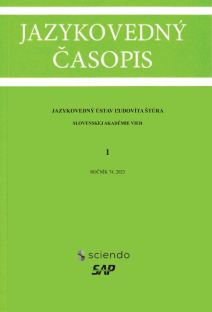Spanish Synonyms as Part of a Multilingual Event-Type Ontology
Spanish Synonyms as Part of a Multilingual Event-Type Ontology
Author(s): Cristina Fernández-Alcaina, Eva Fučíková, Jan Hajič, Zdeňka UrešováSubject(s): Language and Literature Studies, Theoretical Linguistics, Applied Linguistics, Syntax, Semantics
Published by: Jazykovedný ústav Ľudovíta Štúra Slovenskej akadémie vied
Keywords: multilingual; ontology; semantics; valency; verbs
Summary/Abstract: This paper presents an ongoing work on the multilingual event-type ontology SynSemClass, where multilingual verbal synonymy is formalized in terms of syntactic and semantic properties. In the ontology, verbs are grouped into synonym classes, both monolingually and cross-lingually. Specifically, verbs are considered to belong to the same class if they both express the same meaning in a specific context, and their valency frame can be mapped to the set of roles defined for a particular class. SynSemClass is built following a bottom-up approach where translational equivalents are automatically extracted from parallel corpora and annotated by human annotators. The task of the annotators consists in mapping the valency frame of a particular verb with the set of roles defined for the class where the verb is included as a potential class member, establishing links to external resources, and selecting relevant examples. The Spanish part of the ontology currently contains 257 classes enriched with Spanish synonyms. The resulting resource provides fine-grained syntactic and semantic information on multilingual verbal synonyms and links to other existing monolingual and multilingual resources.
Journal: Jazykovedný časopis
- Issue Year: 74/2023
- Issue No: 1
- Page Range: 153-162
- Page Count: 10
- Language: English

